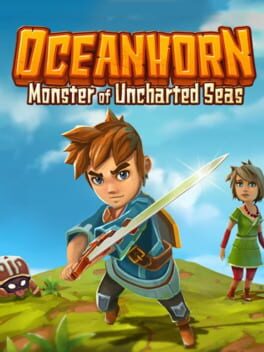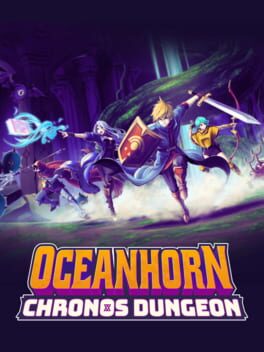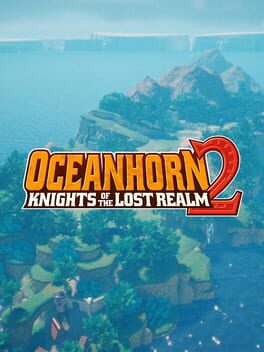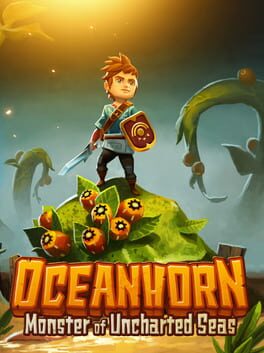

You wake up and find a letter from your father. He is gone… The only lead is his old notebook and a mysterious necklace. What happened? Explore the islands of Uncharted Seas, a world filled with many dangers, puzzles and secrets. Fight monsters, learn to use magic and discover ancient treasures which will help you on your quest. Use all your wits and skill to unravel the mysteries of ancient kingdom Arcadia and sea monster Oceanhorn. Oceanhorn combines captivating storytelling, breathtaking 3D visuals and exciting gameplay into one massive action adventure experience you will never forget. Enjoy an incredible soundtrack from the best video game composers in the world: Nobuo Uematsu (Final Fantasy*) and Kenji Ito (Seiken Densetsu*) Master the game effortlessly with accurate touch controls or controller. Please Note: Oceanhorn is a free to download premium game with a single in-app purchase to unlock the full version. You can play the first chapter for free and test it on your device first.
Also in series
Reviews View More
This review contains spoilers
Story
The game begins with the main character's father leaving to battle the ancient monster known as Oceanhorn and ends with father and son reuniting. The relationship between father and son, while cliche, is an obvious opportunity for interesting story telling, and Oceanhorn completely fails to write their story to be any more than 'dad leaves, son finds him and defeats monster, both are together again'. Seriously, it's that simple. You won't find any emotion in either of these characters, or any of the hollow characters in this game for that matter. For example, the son could have had a complicated daddy complex, thinking that his father abandoned him, with dad's sudden disappearance being misunderstood. Instead we have a father that left to fight a monster, leaving a clear journal behind (no mysteries here) and when they are reunited the dad just spews out some light history of the world instead of exhibiting any ounce of emotion. What we have here is a very generic, linear story with our hero catching up to his dad and defeating a big monster.
The overarching story is that the world is not what it used to be and the only way it can be restored is to defeat Oceanhorn. Yet, other than the aquatic half-human half-fish people who claim the open sea is too dangerous for them to swim out in, everyone seems very normal and extremely happy in the game, hardly a group of oppressed people in a dark world. The town people freely wander about their island, run shops, and even hold a joyous festival. Boats pass you in the open sea and relay cheerful messages in your direction as you sail past them. It's almost as if the person that wrote the primary story and history for the game forgot to coordinate with the person that wrote the character dialogue and events.
Gameplay & Controls
The controls were relatively easy to get used to, and with the exception of sometimes directing my character slightly in the wrong direction I found them to be fairly seamless. And the controls are pretty basic, primarily consisting of moving the character, an action button (attack, grab, talk, etc.) and a secondary action such as your shield or bombs.
The battles between common enemies become repetitive very quickly and require little to no tactics: you swing your sword or you throw an object at them.
The world is comprised of a series of islands which are fragmented by open water. The player uses a small sailboat to traverse between the regions, and during travel some bombs and enemies occasionally (and in a very formulaic way) appear straight ahead of the player, which must be blasted out of the way with a pea-shooter. The process of traveling between islands, something that could have included interesting quests and moments of exploration, is instead filtered down into a boring mini-game that the player is forced to repeat over and over.
Enemies
At a point in the game I earned an achievement for having seen all of the enemies, and usually when I get an achievement I momentarily feel a sense of satisfaction, but in this case I instead felt a great disappointment, thinking to myself "really, that's the last unique enemy I'm going to see in this game?" With only a handful of baddies the world felt rather small and uneventful, and with their limited AI I often felt like I was fighting only two enemies the whole game: the ones that charge directly at me and the ones that zigzag a little then charge at me.
There are four or five boss battles, all with a winning strategy that is discovered rather quickly. Toss bottles at this guy, block lasers with your shield against that guy...you get the point. The boss fights aren't terrible, they just aren't very fun or interesting either, and are yet another missed opportunity in this game.
Items & Weapons
The weapons in Oceanhorn are what make for the most similarities to Zelda (arrows, bombs, and even a sword that shoots magic when your hearts are full), not to mention other cloned items such as quarter heart pieces you collect to make a full heart container.
One strange item worth noting is a flute that you receive near the end of the game. The item itself isn't strange, but rather the odd way it is just thrown into the game is what really felt odd and lazy. The flute is in the final dungeon, sitting out in the open, on a narrow pathway that the player has to pass through. It really feels like the developers decided to add in the item after they had already fully planned out and started to develop the environments. In other words, it is as if the developers had this conversation:
Developer 1: "What if we have a flute that the player has to use in order to control the monster at the end?"
Developer 2: "But where can we put it? I already finished all of the levels. I will need to build out a new puzzle, add a chest for it, or maybe create some extra story and instruction for finding it."
Developer 1: "Naw, just drop it right in the open on the final path to the final boss so the player just awkwardly and forcefully picks it up with no build up, discovery, or challenge whatsoever."
Following the theme of content that isn't quite fully thought out are the coins that are collected by chopping down bushes, defeating enemies, or discovered in treasure chests. Coins (or a like form of currency) are extremely common in RPGs and usually provide for some added depth and customization, allowing players to purchase upgrades, refill items, unlock rare content, bribe guards, or change the appearance of a character. But in Oceanhorn instead you get only one shop with many near useless items and only one item worth purchasing, which is a heart container. Why would I spend coins on a potion that immediately refills my health or mana when I can quickly refill them by slashing down a couple of bushes next to the shop? Instead, a useful, similar item would be health and mana potions I can carry with me and use at a later time, such as when I am battling a boss and am in desperate need of a refill. In the end I had over a thousand spare coins and nothing interesting to spend them on, making me feel as if the time I took seeking out the various chests in the game was rather pointless.
Town
There is one town in Oceanhorn, consisting of one shop, some houses, people milling about, and some dungeon elements. This is where I expected to gather side quests and missions, the content meat that fits snugly between the bread that is the story arc. Fitting with the lacking content theme of this game I became rather displeased upon the realization that there is basically only one side quest in the entire game, and it is to collect red rocks to be later returned for a single prize. I enjoyed seeking out the red items, which forced me to fully explore each environment, but of course wished to see additional quests.
Dungeons & Puzzles
The dungeons and puzzles are both repetitive and predictable, only increasing in complexity or difficulty in a few select places. Most puzzles consisted of stepping on a button (or placing an object on a button) which opened a nearby door. I did this same, lame "puzzle" so many times that I would walk into a room and hope that this is going to finally be the point where something unusual happens, but it just never came. Instead I would approach a puzzle and even for the ones that were slightly more complicated than the typical button press were usually so simple that the instant resolution that popped in my head was always the correct, and simple, solution. In the end there were zero thought-provoking puzzles, and referring to them as puzzles is an injustice. The massively unfortunate part is that the mechanics needed for generating more interesting challenges were already present in this game, so the primary blame, in my eyes, is on the designers that did not take enough advantage of the tools available. For example, some puzzles involved the player pushing a box aside to reach the other side, and in almost every case the player had to only push one box to get past. Why not have the player push multiple boxes in a unique combination in order to reach their goal? And with a little extra work the puzzles could have been greatly expanded, such as actually making a puzzle-tied use for the freeze spell, which was something I earned in the game and never used (literally never).
Difficulty
Combine the simple puzzles, easy combat system, and straight forward story and you have a very easy game. A player can refill his or her hearts with ease by breaking a few bottles or cutting down some bushes (which are everywhere) and losing to an enemy is a rarity that should only occur when a player is looking up from their iPhone to glance at the real world.
Summary
Overall, Oceanhorn feels rushed and simplistic. While it has the framework of a good game it came up short due to a lack of content, a lackluster story, and predictable elements throughout. The fact that this game borrows so many core elements from Zelda is not the reason why this game fell short for me, as I was actually excited to play something Zelda like on my iPhone, but rather the laziness that this game embodies ruins what otherwise is a decently structured game with a poor execution.



